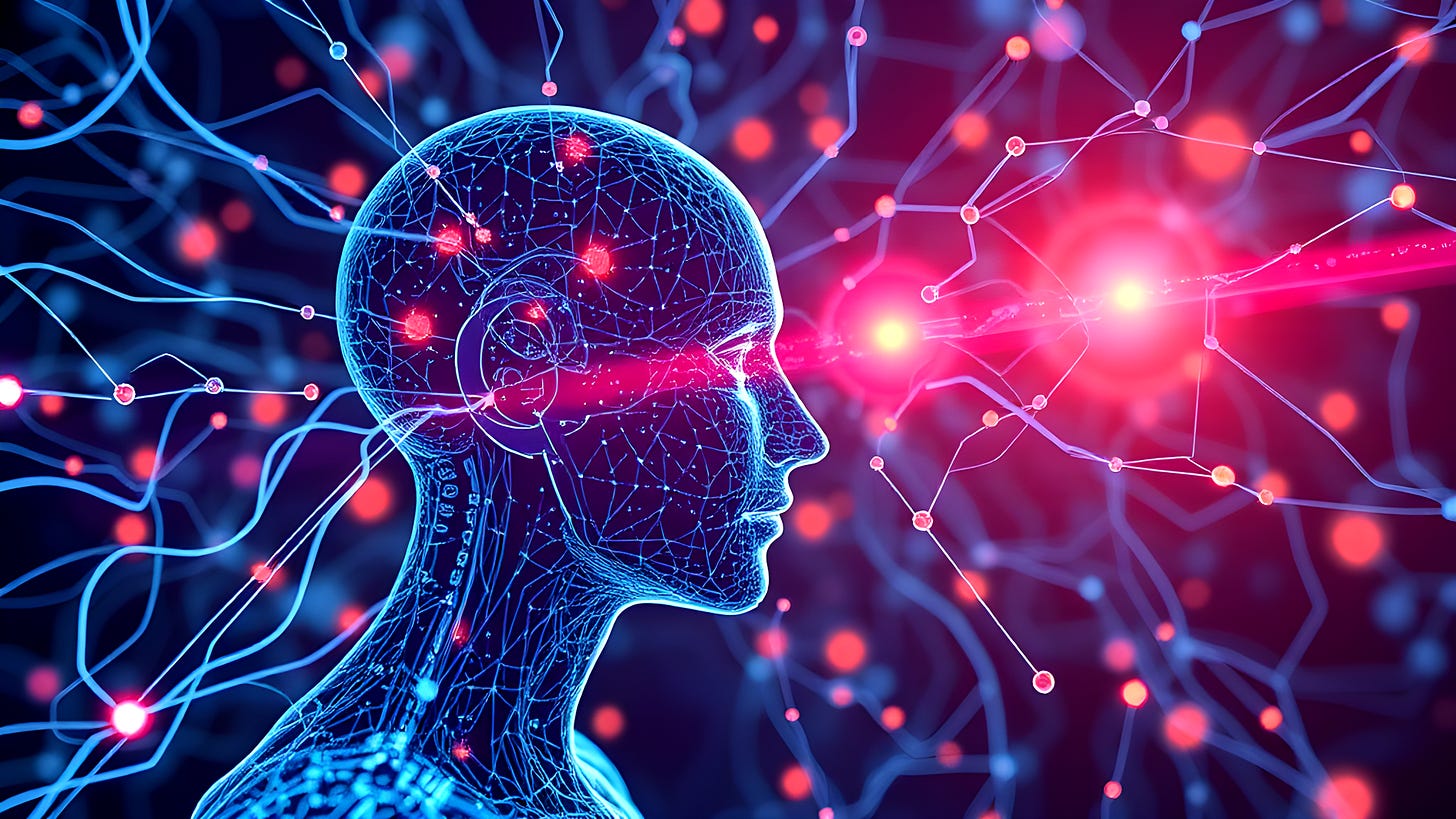Introduction
As the education sphere undergoes seismic shifts, one of the most transformative forces in that sector has increasingly become Artificial Intelligence (AI) and the business of being an edupreneurism. Introduction
In this edition, I'd like to follow up on my recent publication, The Edupreneurs' Foundation: Principles of Educational Entrepreneurship, and previous newsletter editions by exploring the future possibilities of AI within education and concluding why edupreneurs are needed now more than ever to help shape and guide this process.
AI: The Game Changer Strobe — Brighter News in Action
Artificial Intelligence (AI) has the potential to transform education in significant ways, from creating customized learning experiences to making education more accessible to different groups of learners and giving teachers new tools to help them teach better.
AI can have one of the most powerful effects on students and their learning. One important reason is its ability to personalize learning experiences. AI algorithms can differentiate among hundreds of millions of databases and analyze student data in detail to create customized learning paths based on their strengths, weaknesses, and styles. Personalizing an education for students can lead to better learning experiences and ways to engage them.
For example, AI adaptive learning technologies can change content's difficulty level and nature in real-time by analyzing student performance. Such a teaching method allows students to be challenged in all the right ways without being overwhelmed or understimulated.
AI Systems and On-Demand Support
Tools such as AI-driven curricula, tutoring systems, and instant writing feedback are instantly available to students. These systems can be available on demand, addressing mismatches in educational resources and providing support tailored to every student's learning speed and method.
One of the most striking examples is Jill Watson, an AI-driven teaching assistant from the Georgia Institute of Technology. Interestingly, Jill Watson answered around 10,000 student queries each semester with an accuracy of at least 97%, showcasing the possibility of AI as a valuable tool in supporting educators by handling mundane questions.
Democratizing Education
Artificial intelligence can also help democratize education by giving more people equitable and inclusive access to high-quality learning tools. This also means providing access to education to underprivileged communities and ensuring equal access of all students to any needed learning tools and materials.
For example, edupreneurs, such as Summit K12, Curriculum Associates, and others, have incorporated AI-enhanced components into their tools that prove effective for English learning through personalized learning and AI voice technology. These tools highlight the ability of AI to transcend language barriers and create educational opportunities.
Augmented and Virtual Reality: Immersive Learning
AI combined with AR and VR Technologies can provide users with immersive learning environments by simulating real-world scenarios. This is particularly useful for subjects that require practical implementation, as these technologies allow students to receive hands-on experience within a regulated environment.
AI enhancements help create immersive experiences. AI algorithms adapt user interactions to create suitable narratives and pool relevant insights for each user. This approach not only gamifies learning but also provides students with airtime for practice in a low-risk environment.
Edupreneurs can help revolutionize education by providing much-needed innovations and solutions in various educational aspects. Edupreneurs and educators alike agree that skillfully applying entrepreneurial skills to educational endeavors is critical in determining the future of learning.
The Fuse for Integrating Technology
Edupreneurs have pioneered the technology and digital tools to make education delivery more interactive and create a seamless student learning experience. These professionals are key in designing and executing AI-based education resources that facilitate the learning experience.
For instance, Salman Khan, the founder of Khan Academy, has changed the game in terms of accessibility to education by providing free online educational material through video tutorials and practice exercises. He has made education available for millions of students across the globe, showcasing how edupreneurs can use technology to democratise education.
Encouraging Lifelong Learning
A significant trend that edupreuners are fostering is the shift towards continuous learning. They saw a demand for continuous education and skill development, creating online courses, webinars, and e-learning platforms and utilizing technology and novel pedagogical methods to democratize education. These efforts have provided broader access to high-quality learning experiences not limited by location or cost.
Growth Mindset and Innovation
A growth mindset drives organizations that promote a culture of experimentation and innovation within educational establishments. These organizations bring fresh approaches to teaching and learning environments and help create a much more fluid and agile education system.
For example, New Leaders, a non-profit, has dedicated itself to developing exceptional education leaders who drive positive change. Using groundbreaking research and learning models, New Leaders provides premier leadership training across all educational roles—teacher leaders, school principals, and district supervisors. They ensure continuous academic growth for students in every classroom.
Ethical Issues and Challenges
While the use of AI in education is a growing trend that provides several advantages, it also entails a couple of challenges and ethical concerns that must be addressed.
Data security is one of artificial intelligence's most significant ethical challenges. Many AI systems in education require collecting and analyzing large amounts of data, which creates concerns about how that data gets stored, who has access to it, and what they do with it. Though the benefits of AI can be great, Protecting student privacy is paramount and being thoughtful about data security will aid you in developing your tools.
Because AI systems process vast amounts of data to learn trends and make decisions, they may unintentionally mirror or even amplify human biases, creating the risk of discrimination. This is especially troubling in the context of admissions and grading, where biased algorithms could limit equal opportunity for all students.
Artificial intelligence has also been found to apply a cultural bias based on aggregated historical data. Examples of such bias include associating certain occupations with specific genders (e.g., "nurse" with women, "engineer" with men), assuming a Western cultural perspective when generating text, perpetuating stereotypes about different ethnicities, misinterpreting culturally specific language, and being more likely to create positive associations with dominant cultural narratives while neglecting minority perspectives.
The onus is on edupreneurs and AI developers to identify and eliminate these disparities from their systems. Otherwise, the information they provide has the risk of growing more divided amongst students by reinforcing biases.
Some educators also worry that an overreliance on AI will undermine the traditional student-teacher relationship, which allows students to develop social skills and emotional intelligence. AI and edupreneurial innovations must supplement—not supplant—what matters most in teaching: the human touch.
Conclusion
AI and edupreneurs have the potential to profoundly change education as we know today. With AI rapidly improving personalized learning, offering on-demand support, and simulating real-world experiences in the classroom, edupreneurs are pushing forward with new technology integration and purpose-built solutions for specific educational pain points.
Integrating AI with edupreneurship can create a storm of opportunities in every direction, quickly turning the education sector into an intelligent and progressive pipeline. Moving forward, it is important to collaborate between educators, policymakers, and edupreneurs to take advantage of this potential and build an educational ecosystem whereby students are ready for global challenges and opportunities.
Reflection Questions
How might integrating AI in education affect the development of students' critical thinking and creativity skills in ways that traditional teaching methods cannot?
What role should human teachers play in an AI-enhanced educational environment, and how can we maintain the essential human connection in learning?
How can we ensure that AI-driven educational tools promote inclusivity and reduce rather than amplify existing educational inequalities?
What ethical considerations should edupreneurs prioritize when developing AI-powered educational solutions?
How might the rise of personalized learning through AI impact traditional classroom dynamics and social learning experiences?
Tasks
Research and Analysis: Identify three successful edtech startups that have effectively integrated AI into their educational solutions and analyze their impact on learning outcomes.
Practical Application: Design a framework for implementing AI-powered personalized learning in a traditional classroom while maintaining meaningful teacher-student interactions.
Case Study Development: Document the transformation of a specific educational institution that has successfully incorporated AI tools, highlighting both challenges and successes.
Policy Review: Examine current educational policies regarding AI implementation in schools and draft recommendations for necessary updates or improvements.
Stakeholder Engagement: Create a survey or focus group plan to gather insights from teachers, students, and parents about their experiences with AI-enhanced learning tools.
#EdTechInnovation #AIinEducation #FutureOfLearning #EdupreneurshipImpact #PersonalizedLearning @SummitK12 @khanacademy @NewLeadersOrg @CurriculumA







